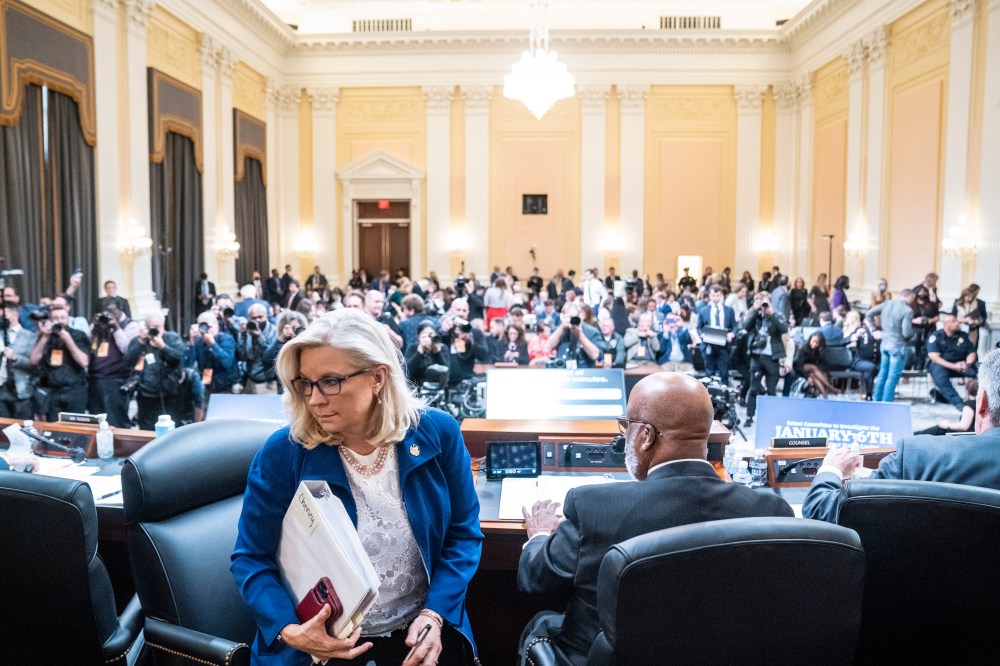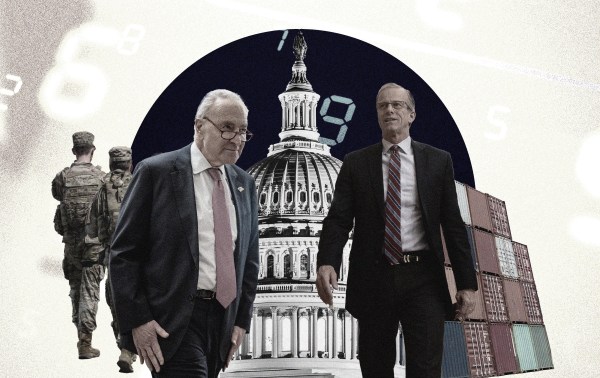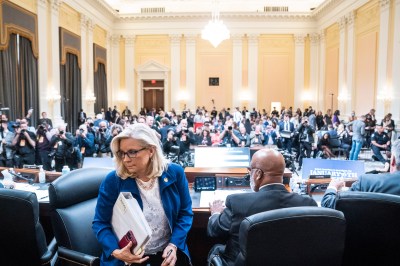Happy Friday! To be a Bears fan is to willingly subject yourself to decades of agonizing psychological torment knowing full well there is no hope of reprieve. We wouldn’t wish this life upon our worst enemy.
Quick Hits: Today’s Top Stories
- The Bureau of Labor Statistics reported Thursday the Consumer Price Index rose 0.4 percent from August to September, while increasing at an annual rate of 8.2 percent—a slight decrease from last month’s year-over-year rate of 8.3 percent. Increases in the cost of food and shelter in September were somewhat mitigated by falling energy prices, but energy prices have begun rising again since the data was collected. Markets dropped when the report was published, but rallied to end the day up between 2 and 3 percent.
- The Social Security Administration announced Thursday Social Security recipients will receive an 8.7 percent boost in benefits in 2023, the largest such cost-of-living adjustment in more than four decades. Beginning in January, per the announcement, the average Social Security recipient will receive an extra $140 per month.
- Russian forces on Thursday continued their onslaught on civilian targets across Ukraine, attacking cities from Kyiv to Mykolaiv with missiles and Iranian “kamikaze” drones. After NATO defense ministers met on Thursday, the alliance’s Secretary General Jens Stoltenberg announced member countries will deliver Ukraine drone jammers and other munitions. France and the United Kingdom pledged to provide Ukraine with air defense systems in the coming weeks, to better protect the country from Russian strikes.
- North Korea launched yet another short-range ballistic missile into the sea this morning, according to South Korea and Japan’s defense ministries. The test reportedly came after 10 North Korean war planes flew near the country’s border with South Korea, causing Seoul to scramble its fighter jets and carry out a “proportional response maneuver.”
- In an unsigned order from which no justice dissented, the Supreme Court on Thursday rejected former President Donald Trump’s appeal of a late-September decision by the 11th U.S. Circuit Court of Appeals that had prohibited a special master from reviewing approximately 100 documents with classification markings seized from Mar-a-Lago—and allowed federal agents to continue using the documents in their ongoing criminal investigation.
- Five people were shot and killed during an active shooter situation that locked down a neighborhood in Raleigh, North Carolina, yesterday, with two others injured and transported to a nearby hospital. Raleigh Police Lt. Jason Borneo told reporters a young man is in custody, and additional information will be provided today.
- A jury in Florida on Thursday opted against the death penalty for the now-24-year-old gunman who killed 17 people at Marjory Stoneman Douglas High School in Parkland in 2018, sentencing him instead to life in prison without parole. Under Florida law, a jury must vote unanimously to condemn someone to death, so mitigating factors—the shooter’s alleged fetal alcohol syndrome and childhood abuse—convinced at least one juror a life sentence was more appropriate.
- American College Testing published a report Wednesday showing the national average ACT score for the high school class of 2022 was 19.8, the lowest level in more than 30 years. A whopping 42 percent of graduating students met none of the ACT’s four college readiness benchmarks, up from 38 percent in 2021. “This is the fifth consecutive year of declines in average scores, a worrisome trend that began long before the disruption of the COVID-19 pandemic, and has persisted,” ACT CEO Janet Godwin said. “They are further evidence of longtime systemic failures that were exacerbated by the pandemic.”
- A new study published in the Journal of the American College of Cardiology this week found that Paxlovid—Pfizer’s COVID-19 antiviral therapy—should not be taken concurrently with several commonly prescribed cardiovascular medications, as co-administration could potentially cause significant drug-drug interactions and may lead to severe adverse effects. Their conclusions—that Paxlovid should be avoided when potentially interacting cardiovascular medications cannot be safely interrupted—are based on drug-drug interaction data and not specific adverse events that have been reported.
- Separately, Pfizer and BioNTech reported Thursday that, according to early Phase 2/3 clinical trial data, their updated bivalent COVID-19 booster generates a robust immune response against the BA.4/BA.5 Omicron subvariants.
- The average number of daily confirmed COVID-19 cases in the United States declined about 18 percent over the past two weeks according to CDC data, while the average number of daily deaths attributed to the virus—a lagging indicator—fell 13 percent. About 21,100 Americans are currently hospitalized with COVID-19, down from approximately 23,600 two weeks ago. HHS Secretary Xavier Becerra on Thursday extended the country’s COVID-19 public health emergency another 90 days, despite President Joe Biden declaring last month that “the pandemic is over.”
- The Labor Department reported Thursday that initial jobless claims—a proxy for layoffs—rose by 9,000 week-over-week to a seasonally adjusted 228,000 last week, the highest level in more than a month. Still, the measure remains near historic lows, signaling the labor market—though cooling—continues to be tight.
A Website Update
It’s been a busy few days at Dispatch HQ since we launched our new website, and we want to thank our members for all the patience you’ve shown us and encouragement you’ve sent our way. We’ve learned a lot over the past few months as we worked with developers to design and build this new tech stack—and we’ve learned even more over the past 48 hours!
We appreciate the constructive feedback many of you have shared with us this week—we’re taking your emails and comments to heart. This was always going to be an iterative process, and we’re hard at work making improvements—particularly to newsletter design and delivery and the comment section. We’re confident that when it’s all done, you’ll agree we’ve made things better and that the hiccups along the way were worth it. Thanks for bearing with us.
January 6 Committee Wraps Up
During what is likely to be the group’s public hearing, the House select committee investigating January 6 unanimously voted on Thursday to subpoena Donald Trump. If he complies, he’d be the fifth former U.S. president to testify before Congress. But will he?
Trump played tough on Truth Social yesterday—asking the committee why they waited so long to call him, promising to deliver a strong response later today. But the move puts him in a tough spot. It’s unlikely he’s thrilled about the possibility of submitting to questions under oath. Yet if he refuses to comply, he could be held in contempt of Congress, like his former adviser Steve Bannon.
Thursday’s hearing—technically a “formal committee business meeting,” which allowed for the vote on the subpoena—featured no live witnesses. All nine members participated.
The committee also revealed new information surrounding Trump’s motivation and intent when it came to overturning the 2020 presidential election. The committee submitted evidence supporting the notion that Trump’s plan to hold onto power despite losing to Joe Biden was “premeditated.”
On October 31, 2020, outside adviser Tom Fitton emailed a draft statement to Trump’s staff in the president’s voice, claiming that he won the election based on “ballots counted by the Election Day deadline”—even though everyone, including Trump’s most loyal political advisers, knew that not all legal ballots would have been counted on Election Night. Fitton forwarded the message to Trump’s team again on Election Night and indicated that he had spoken to the president about it.
Fitton’s messages comport with other Trump associates’ pre-election statements that Trump would declare victory on Election Night regardless of the results. “The key thing to do is to claim victory,” longtime Trump associate Roger Stone said. “F–k the voting, get right to the violence,” he said in another clip.
Stone was one of at least 30 witnesses who invoked his Fifth Amendment right against self-incrimination when he spoke to the committee, Cheney said. Rep. Zoe Lofgren, who presented the video clips, also emphasized Stone’s close ties to the Oath Keepers and the Proud Boys, two groups whose members have been indicted for seditious conspiracy in connection with the storming of the Capitol.
After the election, Trump was aware he lost, according to the pre-recorded video testimony of some of his White House staff. Former White House Communications Director Alyssa Farah said Trump complained to her about Joe Biden’s victory: “Can you believe I lost to this effing guy?” Cassidy Hutchinson, a former aide to White House Chief of Staff Mark Meadows, testified that an angry Trump told Meadows, “I don’t want people to know that we lost.”
Trump’s awareness that his term was coming to an end influenced his behavior, too. As previously reported in Bob Woodward and Robert Costa’s book Peril, Trump issued what Chairman of the Joint Chiefs of Staff Gen. Mark Milley called a “non-standard” military directive on November 11 to withdraw all troops from Afghanistan and Somalia—a rushed attempt to accomplish long-standing foreign policy goals before leaving office.
As the January 6 joint session of Congress approached, key military, intelligence and law enforcement entities knew of the potential for violence—“and not just violence generally, but violence directed at the Capitol,” said Democratic Rep. Adam Schiff.
Milley recalled hearing Deputy Defense Secretary David Norquist say in a call that “the greatest threat is a direct assault on the Capitol.” And Norquist wasn’t the only person with concerns. A pair of emails from December 24 and 26 showed that the Secret Service had been tipped off.
The first email was an alert that some protesters planned to “start marching into the chambers.” The second email relayed a tip from the FBI saying that the Proud Boys “detailed their plans on multiple websites,” including TheDonald.Win.
“They think that they will have a large enough group to march into DC armed and will outnumber the police so they can’t be stopped,” the source said. “Their plan is to literally kill people. Please please take this tip seriously and investigate further.”
Unfortunately, the Proud Boys and the mob that followed them onto the Capitol grounds and into the building did outnumber the police.
“A key lesson of our investigation is this: our institutions only hold when men and women of good faith make them hold, regardless of the political cost,” Cheney said yesterday. “We have no guarantee that these men and women will be in place next time.”
Worth Your Time
- President Biden is right to be concerned about Vladimir Putin’s nuclear threats, but vocally agonizing over the issue—comparing the moment to the Cuban Missile Crisis, warning that the world faces Armageddon—doesn’t do anyone any good. Biden’s public expressions of anxiety “reward Russia for making nuclear threats,” Kori Schake writes in The Atlantic. “Worse yet, [it] telegraphs to every aspiring authoritarian the value of having nuclear weapons. That, in turn, poses a distinct problem for the U.S. Because of its superior conventional forces, which can win wars without resorting to nuclear bombs, America is a major beneficiary of the nuclear taboo. Still, the entire world is safer with fewer nuclear-armed powers, and showing dictators that nuclear threats are the way to tie Washington up in emotional knots will only undermine global security. The right response to Putin’s nuclear threats is the one that Ukrainians—who are the people likeliest to be victims of Russia’s nuclear use—have already given: This will not change the outcome of the war. That message signals our commitment and diminishes the power of nuclear threats.”
- Mass protests in Iran fizzled out in 2009, 2017, and 2019 without much fanfare. Is there any reason to believe this month’s demonstrations will be any different? “The movement involves young people, mostly women, who are outraged at the murder last month of 22-year-old Mahsa Amini. Their protests appear spontaneous and leaderless, which means there is no infrastructure for the Iranian goon squads to crack,” David Ignatius writes in his latest column. “The movement is broadly dispersed, with protests in 105 cities in all of Iran’s 31 provinces, according to a calculation posted this week by the Human Rights Activists News Agency (HRANA). It’s ethnically diverse—with thousands of Shiite Persians rallying to support the cause of Amini, a Sunni Kurd. Finally, and most important, there are early signs that the movement is jumping from students on the streets into the machinery that runs Iran—petrochemical workers, truck drivers, merchants in the bazaar.”
Presented Without Comment
Also Presented Without Comment
Toeing the Company Line
- On today’s episode of The Dispatch Podcast, Sarah, Jonah, David, and Declan break down a new study on the demographics of students at elite colleges in the United States, dive into the economics behind OPEC’s latest production cut, and discuss the latest midterm developments. Is John Fetterman’s mental acuity fair game? Why is Mike Lee begging for Mitt Romney’s endorsement in Utah? Are voters right to treat senate elections as exercises in pure tribalism?
- Does the United States need to eschew economic liberalism to compete with authoritarian governments that can “play the long game” and take decisive action? Not at all, Scott writes in yesterday’s Capitolism (🔒). “Distant history and recent events give us strong reasons to doubt that illiberal strongmen are such a dire threat to the United States as to necessitate abandoning our open, liberal system and embracing illiberalism and central planning ourselves,” he writes.
- Klon devotes this week’s edition of The Current (🔒) to the Biden administration’s new export controls seeking to limit China’s access to U.S. technologies. The White House “deserves real credit,” he argues, but “all these new rules will be for naught if they are not enforced consistently and aggressively.”
- On the site today, Andrew previews tonight’s Georgia Senate debate between Sen. Raphael Warnock and Republican challenger Herschel Walker, Charlotte breaks down why the war in Ukraine is still unlikely to end soon, Adam White discusses the possible legal vulnerabilities in Biden’s partial student loan forgiveness action, and Dan McKivergan looks at the U.S.’s improving relationship with the country of Vietnam as a counterbalance against China’s ambitions regional hegemony.
Let Us Know
With nine hearings in the books, it’s possible that the January 6 committee has wrapped up their public presentation of the evidence of their investigation. As the dust settles, has it mattered?







Please note that we at The Dispatch hold ourselves, our work, and our commenters to a higher standard than other places on the internet. We welcome comments that foster genuine debate or discussion—including comments critical of us or our work—but responses that include ad hominem attacks on fellow Dispatch members or are intended to stoke fear and anger may be moderated.
With your membership, you only have the ability to comment on The Morning Dispatch articles. Consider upgrading to join the conversation everywhere.